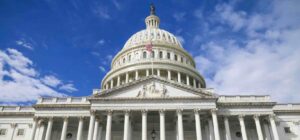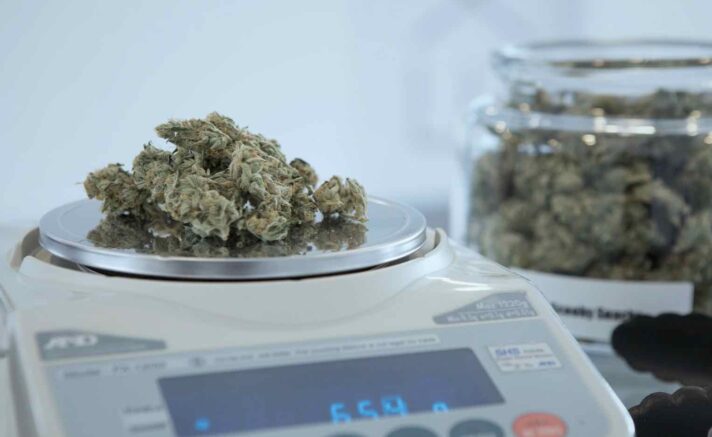I can already sense that your blood is boiling. Just the mention of this man’s name gets you ready to fight. Maybe you’re defending him or maybe you’re attacking him. Whatever side you’re on, Trump has clearly created a division.
But, you know what issue Americans are pretty much all in agreement with? Cannabis legalization.
It’s actually quite incredible if you think about it. “Most Americans see smoking weed as morally acceptable,” which is 70%. And just last year, in 2019, 67% of US adults were in favor of cannabis legalization. That would mean that over two thirds of US citizens are in favor of cannabis being legal, but won’t get the opportunity to vote on it.

The background is surprisingly complicated, even for someone who lives in the US and understands its politics and laws. But it’s important to understand, because a change in how things work could create a massive opportunity. So, stick with me here, as I breakdown the general structure of what is going on:
For starters, each US state can vote on the legality of cannabis.
So far, there are about a dozen US states that have voted and passed legislation to allow recreational cannabis use. As in, you can buy and consume marijuana, just like you would alcohol, with no special permit or license.
There are 33 states that allow medical marijuana, which is where you have to have a license to purchase (the license is basically a doctor’s note saying you have something wrong, ranging from terminal cancer to anxiety).
Now, these laws that each state enacts are supposed to be superseded by federal law. The way that laws in the US normally work is that the federal government has a general rule book, and then states are free to impose more strict laws.

In this situation, by a state legalizing cannabis, they are making the federal laws less strict – and that’s normally not allowed. However, the Rohrbacher-Farr amendment, which was passed in 2014, made an exception where the federal government would not interfere with what the states that did legalize cannabis.
Now, let’s see how this all plays out in practice:
Scenario 1: If you are caught possessing or consuming marijuana in California, there is nothing wrong. In fact, there are actual cannabis consumption lounges and restaurants. Meanwhile, if you get caught with marijuana in Idaho, you could be looking at prison time.
Scenario 2: Let’s pretend you are walking across the border from California into Nevada, which is literally an imaginary line in the sand. If you are in possession of cannabis while standing in California and then you walk into Nevada, both states are totally cool with you. However, the federal government could charge you with interstate drug trafficking for crossing state lines, which can get you serious prison time.
Scenario 3: Banks, that are federally regulated, aren’t allowed to do business with cannabis companies. Furthermore, because of a tax law, called 280E, cannabis companies cannot write off business expenses for the taxes they pay. If you understand how a business works, that basically means that you can’t make money. So, that results in cannabis companies doing business with cash. Literally doing every transaction with cash, keeping cash in the store, and putting cash in a giant safe. Now you know why every single cannabis dispensary in Los Angeles was looted during the recent riot.
The list could go on and on with these examples of how regulation is stepping on the toes of other regulation. In some cases it’s comical, like a cat and mouse game. But in other cases it’s a big deal, that puts people behind bars and tears apart communities.
If this sounds crazy and stupid, that’s because it is. A couple decades from now, we’ll look back at cannabis prohibition as one of the most irrational, special interest fueled, and short sighted laws the US and world has ever seen.

To make it all worse, this isn’t a law that can be easily reversed. PolitiFact does a great job of explaining it, but the bottom line is that it would take time to unravel this thing – probably a couple years – if we went about ending prohibition in a ‘normal democratic’ way.
But there is another, faster option that could happen. I’m sure Trump has thought of this, and he might be saving this one as a secret weapon, although his window of opportunity is quickly closing.
Trump could legalize cannabis in the United States.
It’ll take a lot of red tape cutting, but there is no better time than now to make that happen.
Remember several months ago, around the beginning of the pandemic in the US, when Trump expanded telemedicine access? The summary is that telemedicine has been around for a long time. There is nothing revolutionary about receiving virtual health care.
However, the legality of receiving virtual health care, and more importantly, giving virtual health care, was a different story. In short, doctors were previously restricted to the locations that they could administer their services, based on their licenses. Now, doctors can provide virtual medical care via digital platforms to anyone.
This has created a tremendous opportunity for existing Telehealth companies to expand their services and it has also motivated many traditional health providers to move to a digital platform. (One of our portfolio companies, Heally, has had some great traction lately.)
However, this opportunity in telemedicine would have never happened if we hadn’t been in a crisis. The response to make virtual medical care available for all was fueled by necessity, not through a drawn out democratic vote.
Realistically, that is also the only way we’ll see cannabis legalization on a federal level within the next year. There has to be decisive and sweeping cannabis reform that occurs over an extremely short amount of time. Otherwise, it’ll get clogged up into a multiyear bureaucratic boondoggle.
First, there needs to be sweeping possession, consumption, and cultivation reform. Anyone carrying, consuming, or growing a reasonable amount should be left alone. Period.
Second, there needs to be sweeping incarceration reform the releases all non-violent cannabis related offenders who do not have any prior unrelated offenses. Simple.
Third, there needs to be clear paths for efficient commerce. That includes interstate transportation, access to banking, and taxation structures that are in line with alcohol and tobacco.
Fourth, there needs to be open investment channels into the cannabis space for both private and public sources. Cannabis (marijuana and hemp) has long been a threat to alcohol, tobacco, cotton, steel, plastics, and many other industries. Investment into the cannabis industry allows for more renewable products to be manufactured and also reduces the amounts of imports and foreign dependency. (It will also create more jobs and opportunities that range from simple cultivation to sophisticated manufacturing.)
Of course there are dozens of other measures that could be taken, but let’s just start with those, President Trump.

Finally, if you’ve been wanting to scream, “But what about when Trump doesn’t get re-elected? Obviously the Democrat’s will legalize cannabis!” Not according to a task force formed by Joe Biden and Bernie Sanders. Besides, we all know politicians only do things if they personally benefit, regardless of what side of the aisle they’re on.
Come on, Trump! You wanna really stick it to the establishment?
Show us something that the majority of Americans want. End this insane (and insanely expensive) war on drugs, bring relief to millions of people (including veterans) who are abusing ineffective pharmaceuticals, create more jobs, create more tax revenue, and legalize a plant that was commercially grown by the founding fathers of the US.
How Will This Effect Cannabis Investments?
The resulting opportunities that will stem from federal cannabis legalization in the US are overwhelming. There will be many incredible ventures available for new market entrants, but existing players stand to receive the biggest rewards. And this could happen almost over night.
Let’s look at several scenarios to understand what could happen from cannabis legalization in the US:
Scenario 1: A cannabis brand in Colorado, that makes high-end chocolate edibles is currently restricted to only sell their product within state boundaries. This is because it’s illegal to cross state lines with cannabis (see the example above with someone walking from California into Nevada). Because of this restriction, that means that this company can only expand into new states by building out new manufacturing facilities in each state. This is not only extremely expensive, but it creates a challenge in keeping product consistency if there are multiple different manufacturing facilities being run by multiple different teams. Federal legalization would allow a company to have one centralized manufacturing facility that distributes to the entire US. If you are invested in a company that is in this situation, federal legalization would literally exponentially expand the potential consumer base.
Scenario 2: A cannabis cultivator in Oregon grows and processes some of the highest quality cannabis available. However, they can only supply companies that manufacture joints, edibles, extracts, etc. that are within the State of Oregon. This creates an enormous supply and demand imbalance, as Oregon has very large agriculture capacity but relatively low population (which means they can grow a lot more marijuana than they can consume!). With federal legalization, these cultivators would be able to sell their cannabis to manufacturing companies throughout the US. This would directly benefit the actual grower, but it would also provide price discovery across the US by enabling a competitive market that would value cannabis based on quality of product and quality of business. This would prevent local monopolies that currently exist due to license restrictions and/or transportation/distribution restrictions. For investors in cultivating companies, federal legalization would significantly change the valuation of the cultivator overnight.
Scenario 3: Billions of dollars every year would no longer go towards enforcing cannabis laws (which includes actual enforcement funding, prison budgets, court/legal expenses, etc.). Instead, tax revenues would flow into the government which could fund programs… wait, who am I kidding? Those tax revenues would just get spent on trying to dig ourselves out of this pandemic mess. As an investor, this would mean that many federal agencies, like the DEA, would no longer be targeting domestic and foreign cannabis cultivators. This would open up a whole new world of cannabis opportunities in other countries.
So What’s Actually Going To Happen?
Let’s be real. Cannabis legalization on the federal level in the United States is highly unlikely within the next several years. The only real way it could happen is if Trump issues sweeping, rapid reform that must take place within the next several month (or in his second term, if he’ll even be in the White House…).
So, from an investing standpoint, the options are essentially binary: Continue to navigate the complicated cannabis ecosystem in search of valuable opportunities, OR wait patiently wait for federal legalization with a set of actions ready to implement immediately (as in, be ready to rapidly invest in the right players immediately before legalization).

This guy right here is a real OG. As a cannabis farmer, who even knew how to separate male and female plants for best cultivation methods, the first president of the United States was ahead of his time.
Or is it that we’re behind the times?




